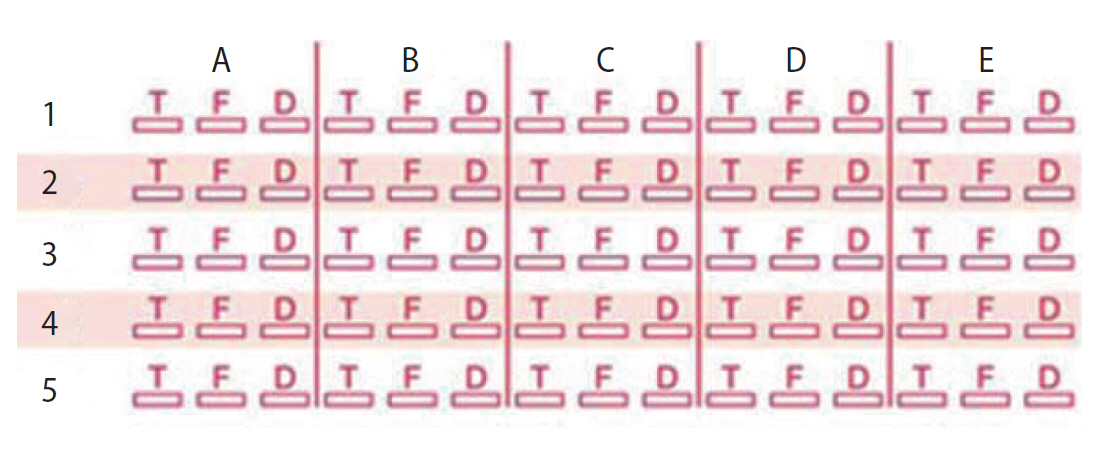J Educ Eval Health Prof.
2016;13:27. 10.3352/jeehp.2016.13.27.
Procedural aspects of the organization of the comprehensive European Board of Ophthalmology Diploma examination
- Affiliations
-
- 1Department of Ophthalmology, Antwerp University Hospital, Edegem, Antwerp, Belgium. danny.mathysen@uza.be
- 2Faculty of Medicine and Health Sciences, University of Antwerp, Wilrijk, Antwerp, Belgium.
- 3Instituut voor Ziekenhuisspecialisten Opleiding, Antwerp University Hospital, Edegem, Antwerp, Belgium.
- 4Department of Ophthalmology, Maastricht University Medical Center, Maastricht, The Netherlands.
- 5Department of Ophthalmology, University of Padova, Padova, Italy.
- 6Eye Clinic, East Tallinn Central Hospital, Tallin, Estonia.
- 7Clinical Research Center Rothschild Foundation, Geneva, Switzerland.
- 8Department of Ophthalmology, Hospital Universitari i Politecnic La Fe, Valencia, Spain.
- 9Eye and Ear Hospital, Irish College of Ophthalmologist, Dublin, Ireland.
- 10Department of Ophthalmology, King's College Hospital, London, United Kingdom.
- 11Department of Ophthalmology, University of Burgundy, Dijon, France.
- 12Department of Ophthalmology, Medical University of Varna, Varna, Bulgaria.
- KMID: 2413776
- DOI: http://doi.org/10.3352/jeehp.2016.13.27
Abstract
- The comprehensive European Board of Ophthalmology Diploma (EBOD) examination is one of 38 European medical specialty examinations. This review aims at disclosing the specific procedures and content of the EBOD examination. It is a descriptive study summarizing the present organization of the EBOD examination. It is the 3rd largest European postgraduate medical assessment after anaesthesiology and cardiology. The master language is English for the Part 1 written test (knowledge test with 52 modified type X multiple-choice questions) (in the past the written test was also available in French and German). Ophthalmology training of minimum 4 years in a full or associated European Union of Medical Specialists (UEMS) member state is a prerequisite. Problem-solving skills are tested in the Part 2 oral assessment, which is a viva of 4 subjects conducted in English with support for native language whenever feasible. The comprehensive EBOD examination is one of the leading examinations organized by UEMS European Boards or Specialist Sections from the point of number of examinees, item banking, and item contents.
Keyword
Figure
Cited by 1 articles
-
Can ‘Fellow of the European Board of Ophthalmology Subspecialty Diploma in Glaucoma,’ a subspecialty examination on glaucoma induce the qualification standard of glaucoma clinical practice in Europe?
Gordana Sunaric-Mégevand, Wagih Aclimandos, Catherine Creuzot-Garcher, Carlo-Enrico Traverso, Anja Tuulonen, Roger Hitchings, Danny G.P. Mathysen
J Educ Eval Health Prof. 2016;13:28. doi: 10.3352/jeehp.2016.13.28.
Reference
-
References
1. Kivela T. The first European Board of Ophthalmology Diploma examination in Milan, June 1995: a candidate’s view. Acta Ophthalmol. 1996; 74:98–99. http://dx.doi.org/10.1111/j.1600-0420.1996.tb00694.x.2. Mathysen DG, Aclimandos W, Roelant E, Wouters K, Creuzot-Garcher C, Ringens PJ, Hawlina M, Tassignon MJ. History and future of the European Board of Ophthalmology Diploma examination. Acta Ophthalmol. 2013; 91:589–593. http://dx.doi.org/10.1111/j.1755-3768.2012.02422.x.
Article3. Boorman J, Mathysen DG, Noel JL, Bloch K, Rouffet JB, Tenore A, Papalois V, Sparrow O, Goldik Z. Survey on European postgraduate medical assessments by the Council for European Medical Specialty Assessments (UEMS-CESMA). MedEdPublish. 2014; 42:1–4. http://dx.doi.org/10.15694/mep.2014.003.0042.
Article4. Mathysen DG, Goldik Z. On quality control and the importance of European postgraduate medical specialty assessments. Med Teach. 2015; 37:886–887. http://dx.doi.org/10.3109/0142159X.2015.1016488.
Article5. Goldik Z; Board of Examiners of European Diploma of Anaesthesia and Intensive Care-ESA. Abandoning negative marking. Eur J Anaesthesiol. 2008; 25:349–351. http://dx.doi.org/10.1017/s0265021508003876.6. Mathysen DG. Statistical evaluation of multiple-choice assessments: development and validation of a statistical analysis method to monitor the European ophthalmology exit examination, and evaluation of examination questions and methods. Antwerpen: Universiteit Antwerpen;2014. p. 200.7. Mathysen DG. Statistical evaluation of multiple-choice assessments: statistical evaluation of the comprehensive European Board of Ophthalmology Diploma (EBOD) examination. Berlin: Lambert Academic Publishing;2014; 200.8. Mathysen DG, Aclimandos W, Roelant E, Wouters K, Creuzot-Garcher C, Ringens PJ, Hawlina M, Tassignon MJ. Evaluation of adding item-response theory analysis for evaluation of the European Board of Ophthalmology Diploma examination. Acta Ophthalmol. 2013; 91:e573–7. http://dx.doi.org/10.1111/aos.12135.
Article9. Mathysen DG, Grupcheva C. Do gender and instructions impact the observed level of self-confidence among candidates sitting a postgraduate medical multiple-choice assessment? Acad J Educ Res. 2014; 2:129–136. http://dx.doi.org/10.15413/ajer.2014.0143.10. Calcagni M. The European board of hand surgery examination. J Hand Surg Eur Vol. 2013; 38:692–695. http://dx.doi.org/10.1177/1753193413488491.
Article11. Case SM, Swanson DB. Constructing written test questions for the basic and clinical sciences. Philadelphia (PA): National Board of Medical Examiners;2002.
- Full Text Links
- Actions
-
Cited
- CITED
-
- Close
- Share
- Similar articles
-
- Can 'Fellow of the European Board of Ophthalmology Subspecialty Diploma in Glaucoma,' a subspecialty examination on glaucoma induce the qualification standard of glaucoma clinical practice in Europe?
- Dose the Self-Assessment(in training examination) for the Residents of Anesthesiology have any Significance?
- A study on a nursing curriculum after a basic 3-year diploma course for the baccalaureate degree
- Adoption of Clinical Skills Examination: the Challenge of National Health Personnel Licensing Examination Board
- Analysis of Current Adult Nursing Curriculum Content in Baccalaureate and diploma Levels


